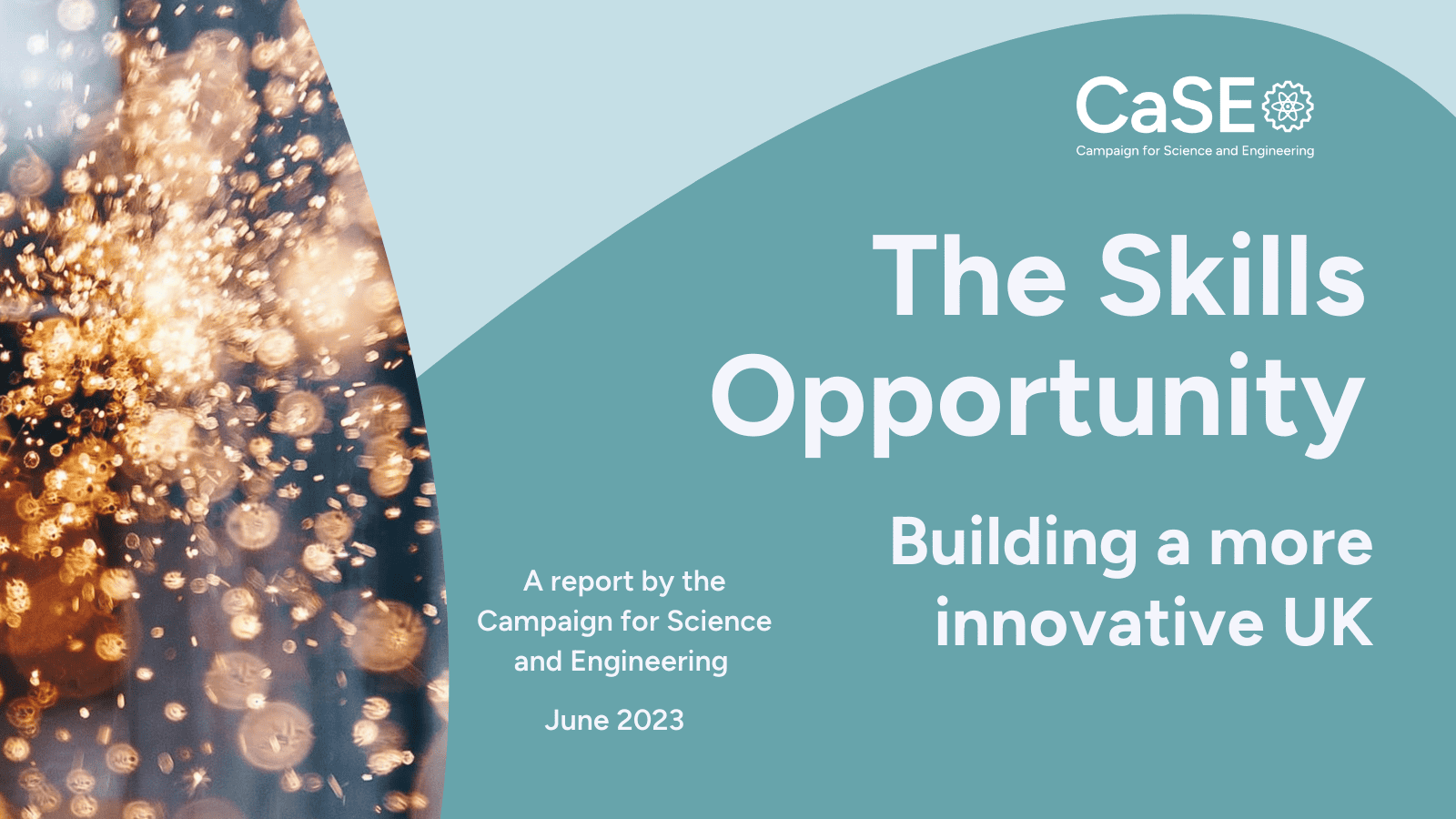In this report we set out some of the challenges for education and skills provision across the UK. We also make a number of recommendations for government to support high-quality education and skills provision to build a more research and innovation intensive economy.
Summary of Recommendations
The ambition to make the UK a more research and innovation intensive economy has been a long-standing commitment across successive governments. But this commitment can’t be kept without an ambitious people strategy to match.
The UK Government and devolved administrations must coordinate and support an integrated skills system to deliver a more innovative and research intensive UK.
Understand skills gaps and needs
- It is necessary to better understand the supply and demand landscape of skills for science and engineering.
- Education provision needs to be better aligned with the changing skills requirements of employers and Government priorities.

Support and incentivise employers and individuals
- A range of incentives are needed to support smaller employers in the provision of workplace training, including formalising the network of intermediary support and streamlining the regulatory framework for apprenticeships.
- Increased and sustainable funding is needed to support a thriving further education sector that supports delivery of high-quality STEM training.
- Careers provision must build on progress to strengthen science and engineering guidance.

Support local talent and innovation
- More needs to be done to raise awareness of available R&D opportunities across the UK and better connect local people with R&D careers that exist locally or regionally.
- Local leaders should be more involved in discussions about regional opportunities and skills requirements to support the new R&D clusters.
- Making places more attractive to live will help to retain skilled people and support the regional diffusion of innovation.

Attract international talent
- The upfront cost of UK visas needs to be reduced in line with international competitors.
- There is a need for greater flexibility in the design of visas to support researcher mobility on a range of timescales.
- Applicants and smaller businesses require support to navigate the visa system.
- More needs to be done to promote the UK as an attractive destination for skilled scientists and researchers.

About the report
The work takes a broad look across a range of dimensions of skills provision, including science teaching in schools and STEM careers advice, through to higher and further education, lifelong learning, and immigration. A series of roundtables explored specific areas of skills provision where there are bottlenecks and pinch points that need unblocking.
We also drew together important work done by other stakeholders in the sector, to bring in perspectives on higher education and have also built on CaSE’s previous work on STEM education. Ultimately, the work aims to highlight the need for a holistic look at skills policy and the need for a cross-Government approach to future skills requirements in the UK.
This report has been compiled with support and guidance from leading experts in the field of R&D, and education and skills policy, who have helped to inform CaSE’s policy positions. The work was supported by an Advisory Group made up of individuals with expertise in R&D, and education and skills policy.
The conclusions and recommendations are based on views gathered over the last 6 months from the breadth of CaSE’s membership, including businesses, universities, charities and learned and professional societies, as well as wider stakeholders. We engaged with organisations across the R&D sector and across the UK to identify challenges and solutions across the education and skills landscape. We gathered evidence using the following methods.
- Four roundtables covering the following areas of education and skills provision: Immigration system; Lifelong learning; Technical education and apprenticeships; Challenges facing Scotland.
- Interviews with universities and other stakeholders to bring in additional perspectives on higher education and devolved considerations.
- Policy workshop with CaSE members and wider R&D stakeholders to test and refine the evidence.
While the work considered specific areas of education and skills provision, the conclusions aim to highlight four cross cutting challenges relevant across different areas of education and skills provision. In doing so, this report aims to highlight the importance of an integrated approach to education and skills provision and to ensuring policy across different areas is coordinated and aligned.
Commenting on the report:
To meet the UK Government’s ambition to become a ‘Science Superpower’ the UK must embrace and enhance skills across the economy. The Government must coordinate and support an integrated skills system, from technical education and apprenticeships, to upskilling and reskilling in the workplace, to unlock skills for a more innovative UK. This report makes recommendations for government that will help businesses in the midst of technology transitions, education and careers advice providers, and individuals looking for opportunities in a more innovative UK.
Ambitions for a more research intensive UK can only be met if the UK utilises the talented and skilled people we already have, attracts international talent and builds a pipeline of future skills. In particular, small innovative businesses need greater support and incentives to provide workplace training and to navigate the immigration system. It’s also crucial that high quality STEM education in schools builds science literacy across society so that everyone can benefit from greater research intensity.
Report Authors

Dr Daniel Rathbone
CaSE Deputy Executive Director

Dr Camilla d'Angelo
CaSE Policy Officer
Register to receive updates about CaSE’s latest publications
"*" indicates required fields


